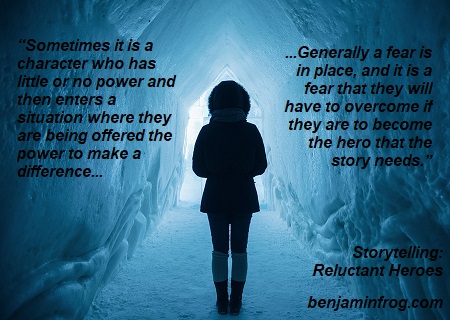Another relatable type of hero is the Reluctant Hero. In fact, these sometimes go hand in hand with Unlikely Heroes to make them even more relatable. It is a character who senses they have the option of doing something heroic but they spend considerable time in the story trying to avoid it.
Sometimes the reason is because they feel they don’t have the power to do anything significant (although if you go that route then you’ll need some explanation as to why the thought of doing something has even occurred to them in the first place). Sometimes it is a character who has little or no power and then enters a situation where they are being offered the power to make a difference. They are afraid of the responsibility, their own character flaws, what it might cost them, or any number of other things. Generally a fear is in place, and it is a fear that they will have to overcome if they are to become the hero that the story needs.
Sometimes it is a character who already has the power to do great things, but they have been focusing on selfish ambitions, or they have been afraid of what becoming a hero might mean, or they are afraid their power will cause more damage than good.
A prime example of a reluctant hero is Frodo Baggins. It’s just not in Hobbit blood to do much of anything adventurous. In the end his desire to protect his homeland overcomes his fears and feelings of inadequacy.
Luke Skywalker is a reluctant hero at first. He longs for adventure but when it falls into his lap he’s like “It’s such a long way from here.” Unfortunately it takes the loss of the life he’s known for him to be willing to step up.
Other examples of Reluctant Heroes…
Strider in the film version of The Lord Of The Rings
Sarah Conner from The Terminator
Simba from The Lion King
Rapunzel from Tangled
Wolverine from X-Men
James Edwards from Men In Black
Bruce Banner from The Incredible Hulk
Nathan Algren from The Last Samurai
Jack Shephard from Lost
Anti-Heroes
I would describe an Anti-Hero as a villain who you want to see succeed because their goals in some way end up benefiting people you care about. I think there are exceptions, but that’s generally what it comes to. Most fictional jerks that people love, like House for example, don’t start off being likeable for who they are but they are able to help people the audience does care about, and so the audience wants to see them succeed by proxy.
Jack Sparrow is a pirate. He steals things – at the very least. For all we know he’s also murdered several innocent people, but we don’t know much about his history. Regardless, in the first film his goal of getting his ship back lines up with Will’s goal of rescuing the woman he loves. Audiences who aren’t much fans of thieves will still end up wanting to see Jack succeed, even if only temporarily, just so that he can help Will to rescue Elizabeth.
Other examples of Anti-Heroes…
Riddick from Pitch Black
Dominic Toretto from The Fast And The Furious
Vegeta from Dragon Ball Z (Seasons 2 and 3)
In my next post I’ll talk about one of the most difficult types of heroes to write – the Symbolic Hero.
Top Photo ‘Wolverine X-men 3’ credit BlackCat Nala under Creative Commons license
For more on these and other writing topics, The Storyteller’s Handbook is available for purchase now.



